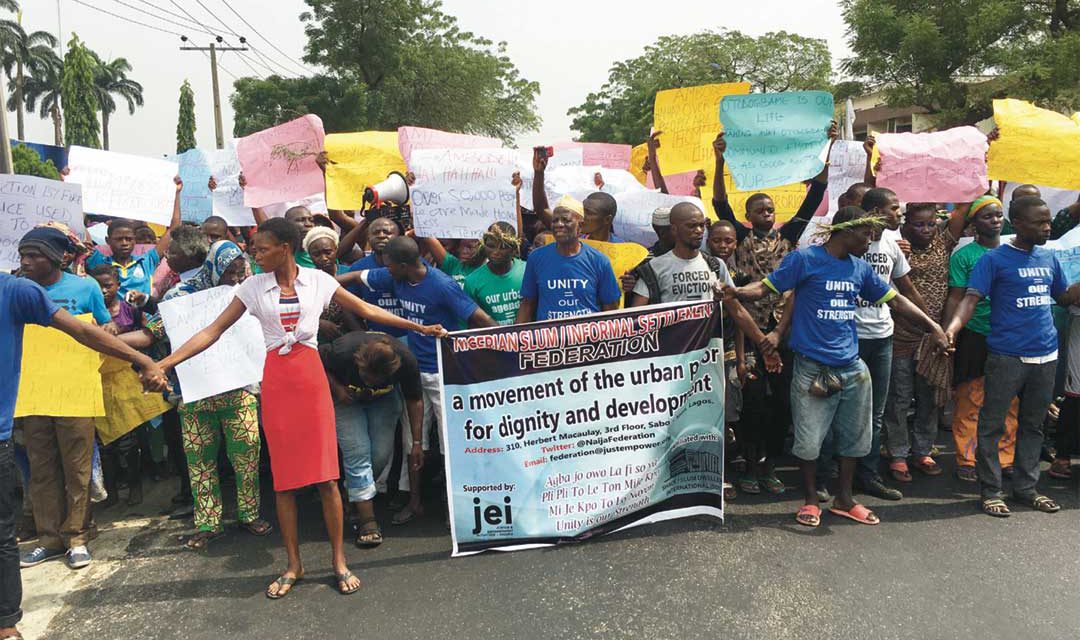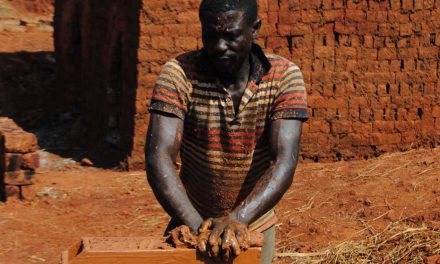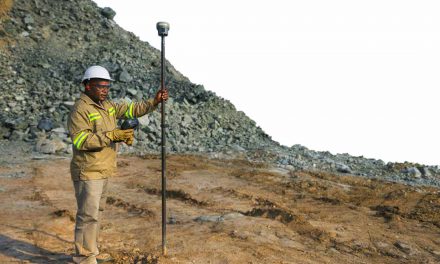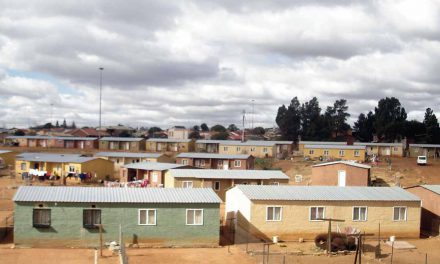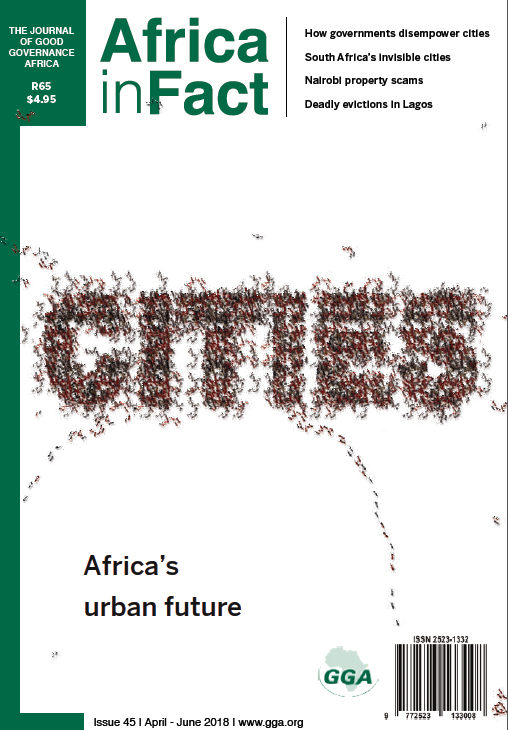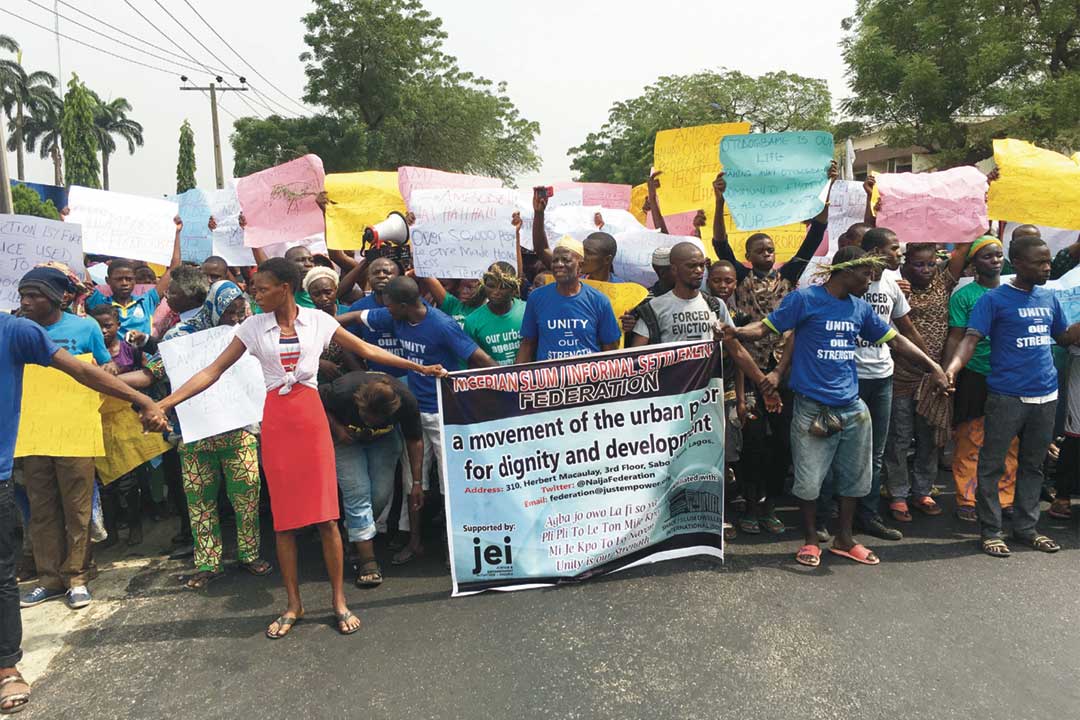
Anti-eviction protests in the Otodo Gbame community in Lagos, Nigeria during 2016. Photo: Justice and Empowerment Initiative
Development efforts by local authorities in a bid to deal with urbanisation have increased incidences of forced evictions, sometimes with deadly consequences
The bulldozers arrived late at night after residents of Otodo Gbame, a waterfront community in Nigeria’s commercial capital, Lagos, had retired for the day. Backed by armed police and machete-wielding men, the excavators began to pull down shacks that dotted the shoreline. As terrified residents fled the chaos, at least nine of them drowned in the nearby lagoon, Amnesty International said. Five months later, in April last year, police returned for a second raid and forcibly evicted some 4,700 residents who had braved the first attack. In all, the Lagos government violently evicted more than 30,000 residents of the community without providing alternative shelter, the rights body said. Eleven people died and 17 went missing.
“My family lost everything; my water pump, engine, our household items were all set on fire by the thugs,” 53-year-old Pascal Tosinhun, who was injured while running from the police during the second raid, told Africa in Fact. Tosinhun said his grandfather migrated to Otodo Gbame in 1909.
A state court declared the evictions “cruel and inhuman” in January last year. Yet, as degrading as the expulsions seemed, they were hardly new. In fact, the expulsions were only the latest state-sanctioned eviction of slum dwellers in Africa’s most populous city. And similar stories are replicated across west Africa and other regions of the continent.
“In recent months and years we have seen an increase in government policies and practices that effectively exclude the urban poor from many of the cities across our region,” South Africa-based Shack/Slum Dwellers International said in a statement in October last year. “These include large-scale forced evictions, attacks on the livelihoods of the urban poor (and) restrictions on accessible/affordable mass-transportation systems.”
With an average annual rate of 1.4% between 2010 and 2015, Africa is urbanising fast, second only to Asia, Brooking’s Africa Growth Initiative said in its 2016 flagship annual report, Foresight Africa. Three African cities, namely Lagos, Cairo and Kinshasa, are already considered “megacities”, with at least 10 million people, and more are expected to reach that threshold in the next few decades.
But unlike other continents, Africa’s rapid urbanisation is happening without structural transformation, the report says. In effect, urbanisation has presented the continent with multiple challenges, but particularly as regards the provision of housing, dealing with the informal economy, and poor sanitation. For instance, in Lagos, which has an estimated 21 million people, two out of three people live in slums, according to a February 2017 World Bank report.
Now, efforts by local authorities to develop infrastructure, protect the environment and beautify sub-Saharan African cities in a bid to deal with urbanisation have also increased incidences of forced evictions. The victims are the continent’s poorest who live in slums – estimated at 72% of the urban population, according to UN-Habitat.
“Across Africa, hundreds of thousands of people each year are forcibly evicted, in many cases left homeless, losing their possessions without compensation and/or being forcibly displaced far from sources of employment, livelihood or education, all in violation of international law, including the African Charter on Human and Peoples’ Rights,” UN-Habitat said in its 2011 report, Housing the Poor in African Cities.
Nowhere is this more pronounced than west Africa, where between 2000 and 2011 in Nigeria alone, two million people were forcibly evicted from their homes in the major cities of Lagos, Abuja and Port Harcourt, according to Amnesty International. In 2013, at least 1,000 people were forcibly evicted in Accra, Ghana’s capital, according to a 2013 Amnesty International report. Between 2003 and 2006, over two million forced evictions occurred in 19 African states, according to a 2006 report by the Centre on Housing Rights and Evictions, a Geneva-based NGO that monitored cases of forced evictions across cities globally until its closure in 2012.
The evictions occurring across the west African region are starkly similar. First, authorities hint of interest in a slum or suburb that has been inhabited for years. Hearing this, the residents likely to be affected rush to court to forestall any encroachment. And then the government defies the order and raids the community unannounced, but without providing alternatives for displaced residents.
South Africa-based Shack Dwellers International (SDI) says governments have deliberately implemented policies that exclude the poor from African cities, contrary to global commitments on building inclusive, resilient and sustainable cities, as articulated in the UN’s Sustainable Development Goals. Amid increasing cases of evictions, the group has partnered with affiliate civil-society organisations in Burkina Faso, Benin, Togo, Nigeria, Ghana, Sierra Leone, Liberia and Senegal to push for “inclusive cities”.
“We are determined to stand together to fight policies and practices that exclude the urban poor from our cities,” the SDI West Africa Hub said in a statement in October last year. The need for advocacy hasn’t diminished, though. In the past two years, evictions of waterfront communities have occurred in Port Harcourt, Nigeria; in Crab Town in Freetown, Sierra Leone; in Old Fadama in Accra, Ghana; and in Badia East in Lagos.
In Accra, a decades-old effort to remove settlers from the Old Fadama area took a more serious approach in 2015 when some 2,000 structures were demolished and their inhabitants dispersed, according to Environmental Justice, based in Accra. The government said it wanted to restore the area’s lagoon and to build a railway system.
In Guinea, between 2015 and 2016, authorities forcibly evicted about 380 households in Guinea’s Kintinian community to make way for an open-pit oxide goldmine controlled by mining giant AngloGold Ashanti. A similar eviction took place in January 2016 in Côte d’Ivoire, where authorities evicted three communities in eastern-central Côte d’Ivoire to pave way for a Belgian firm, called SIAT.
Local authorities often cite increasing urbanisation, infrastructure projects, and a perceived need for city beautification as reasons for the evictions, according to the 2011 UN-Habitat report referred to above. But, increasingly, governments are justifying evictions by citing environmental hazards caused by informal settlements. With rising global concern about climate change and its attendant effects, such as increased flooding, that argument has gained traction.
The deadly cost of unplanned settlement was demonstrated in its most horrific form in Sierra Leone’s capital, Freetown, last August when mudslides killed over a thousand people. Experts agree the disaster was largely caused by human activities. In Freetown, the random construction of homes and the attendant deforestation contributed to the mudslides, says Joseph Rahall, executive director of Green Scenery, a non-governmental organisation working in Sierra Leone to promote environment and human security
“Government should take a firm position on this,” he said in a recent interview with Deutsche Welle, a German news outlet’s English-language website. “Where applicable, if there are ways that people can be resettled or given land in other places, let them do so.”
In line with this trend, the Lagos state government says Otodo Gbame must be cleared to forestall such an environmental risk. “Government will not be stampeded or blackmailed into abdicating its constitutional responsibilities to guard against a potential health and environmental hazard in the area by condoning what amounts to a breach of environmental and urban planning laws,” Lagos’s then Commissioner for Information and Strategy, Steve Ayorinde, said in a statement in March last year. In an undated response to Amnesty International’s report on the evictions, the Lagos government said the Otodo Gbame neighbourhood was one of the city’s “prime waterfront areas of illegal shanties that constitute a security and environmental threat to the general public”.
But activists say while the argument might be tenable, governments have used the claim of environmental threats to justify avoidable evictions. “When the slum gets in the way of tourism development, a flood opens opportunity. The government is using natural disasters as a reason to unilaterally determine the fate of the slum, while ignoring the rights of the people who are impacted,” says Julie Snorek of Environmental Justice.
The UN says forced evictions have a disproportionate effect on the poor, and that almost all forced evictions of poor residents from cities are preventable. “The energy and resources that many communities in African cities have to devote to fighting off threats of eviction could also be used to engage constructively with the city planners and government, to develop creative solutions to their housing needs that also take account of the broader development needs of the city,” UN Habitat said in its 2011 report.
Local authorities have a number of options in providing alternatives to the residents of poor communities, says Rasheed Osinowo of Osinowo and Associates, a Lagos-based town planning firm. Osinowo said local authorities could provide alternatives in three ways: renting apartments for the displaced residents, leasing the land in the contested communities to the residents for some years, or creating a resettlement community.
“Town planners don’t support forced eviction,” he told Africa in Fact. “Government can actually allocate or lease this land to the dwellers for a period, be it 10 or 20 years, or create a satellite town that will always be available to which these people can move.”
Celestine Ahinsu, the Otodo Gbame community youth leader, said that nearly a year after they were forced out of their homes displaced residents were still expecting help from the state government. “We’ve been brutalised and our homes destroyed; the government later took our names promising to resettle us. We’ve not heard anything since then,” he told Africa in Fact.

